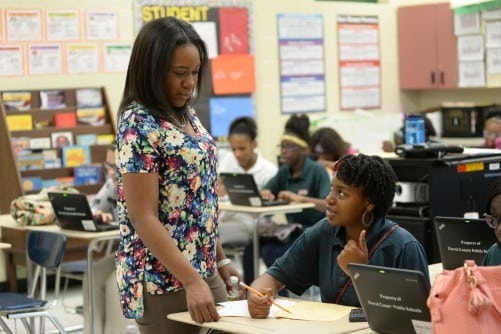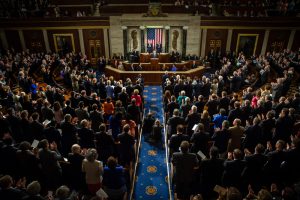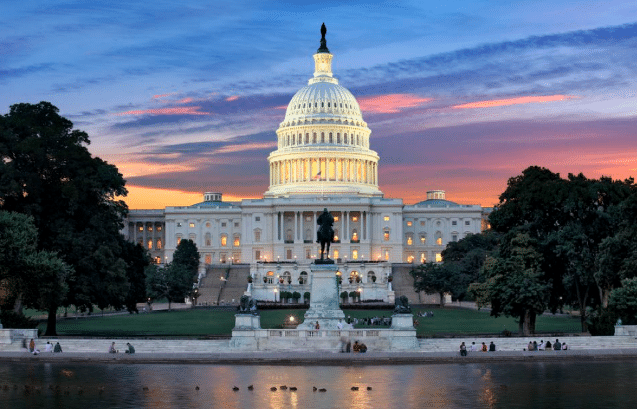11 Oct2019
By AACTE
The American Association of Colleges for Teacher Education (AACTE) celebrates its 20 member institutions that received the 2019 Teacher Quality Partnership (TQP) grants from the U.S. Department of Education announced last week. With grants totaling more than $20 million, the TQP is the only federal initiative dedicated to strengthening educator preparation at institutions of higher education.
“AACTE celebrates all of the grant recipients, especially our 20 AACTE member institutions, because our members work year-round to advocate for continual funding for this critical initiative,” said Lynn M. Gangone, AACTE president and CEO. “With so much volatility on Capitol Hill, we view the consensus to support teacher preparation programs as a huge victory. TQP grants empower our members to extend and elevate their innovative and exemplary work.”
11 Oct2019
By Joanna Norris

The University of North Florida’s College of Education and Human Services was awarded a $1.6 million Teacher Quality Partnership (TQP) grant from the U.S. Department of Education to support innovative teacher preparation models that prepare prospective and new teachers to serve students in high-need schools.
The Department of Education made 31 awards totaling $20.1 million, and UNF was the only university in Florida to receive the funding. Recipients include more than two dozen school districts, institutions of higher education, and nonprofit organizations.
“We know a great teacher is the foundation of a great education,” said U.S. Secretary of Education Betsy DeVos. “By ensuring teachers are able to continually grow and improve in ways that excite and challenge them, we can help students succeed. These grants will help foster meaningful professional development opportunities, especially in the often-lacking areas of STEM and computer science-focused training.”
07 Oct2019
By Deborah Koolbeck
 The U.S. Department of Education announced its new Teacher Quality Partnership (TQP), grant recipients, funding 31 projects with $20.1 million dollars. TQP is the only federal initiative dedicated to strengthening and transforming educator preparation at institutions of higher education. Of the 31 grantees, 20 are AACTE members.
The U.S. Department of Education announced its new Teacher Quality Partnership (TQP), grant recipients, funding 31 projects with $20.1 million dollars. TQP is the only federal initiative dedicated to strengthening and transforming educator preparation at institutions of higher education. Of the 31 grantees, 20 are AACTE members.
The grant program addresses the teacher shortage found across the nation by preparing teachers in high needs fields to teach in high need schools. Grantees focus on either the undergraduate or graduate level, extending clinical practice to a full year or creating a residency program. Graduates receive at least 2 years of induction, which research shows supports teachers in remaining in the classroom after their novice years. In fact, a majority of TQP graduates remain in the profession well after the provided induction and drive transformation throughout their schools and even the school district itself.
For this grant competition, priority was given to those applicants who designed programs to prepare computer science teachers as well as the STEM fields overall, and to those programs taking place in a Qualified Opportunity Zone as designated by the Internal Revenue Service.
AACTE annually advocates for TQP funding through the congressional appropriations process, and supports augmenting the capacity and reach of this grant.
The list of awardees can be found in the Department’s press release.
27 Sep2019
By Jane E. West

This blog post is written by AACTE consultant Jane West and is intended to provide update information. The views expressed in this post do not necessarily reflect the views of AACTE.
It’s been a breathtaking week in Washington as minute-to-minute developments unfold in the House’s decision to pursue impeachment of President Trump. Yet, both congressional bodies continue to move on their legislative agendas. The question becomes, how much oxygen will impeachment suck up and will there be any space left for anything else? And remember the Congress leaves town today for a two-week recess, to return with less than 30 legislative days scheduled before the end of the year! Of course, this could change.
26 Sep2019
By Michael Staton
 This article originally appeared in the Clemson University Newstand and is reprinted with permission.
This article originally appeared in the Clemson University Newstand and is reprinted with permission.
This fall, Clemson’s College of Education has become the first on campus to adopt a college-wide, four-year advising model for its undergraduates. College leadership and student advisors worked collaboratively to develop this approach, which they say aligns the college more closely with the Clemson Forward strategic plan.
This model positions academic advisors to manage all tasks related to student scheduling and degree completion, while faculty members become involved once students transition to the professional level of their respective program area. According to Michelle Cook, associate dean for undergraduate studies in the college, the move will be a true “win-win” for faculty, staff and students in the college as well as the college’s partner school districts.
“Our college prides itself on the personal attention we
09 Aug2019
By Deborah Koolbeck

The U.S. Department of Education launched an Experimental Sites Initiative focused on the Federal Work Study (FWS) program. FWS is a need-based federal program that provides part-time jobs to students to supplement the financial assistance received from the Federal Pell Grant program and other aid sources. The Experimental Site Initiative for FWS waives several of the statutory and regulatory provisions, including that which would limit the number of hours a student could work, permitting full-time opportunities.
19 Jul2019
By Deborah Koolbeck

As Congress rolls into August recess, what is on the “must do” list for September and beyond? Will a budget deal emerge to raise the caps on both defense and non-defense discretionary funds? Could the government default on its debt, or will Congress raise the debt ceiling? What about the Fiscal Year 2020 appropriations deadline of September 30? Is the government going to shut down? Is the Higher Education Act reauthorization in motion or stalled, and what does either one mean for fall congressional activity?
These questions and more will be explored in this AACTE member exclusive webinar. Attendees will have the opportunity to ask questions at the end. This webinar will be recorded and posted on the AACTE Advocacy Center federal page.
Register today!
July 30, 2019 5:00 – 6:00 p.m. EDT
July 31, 2019 11:00 a.m. – 12 noon EDT
Note: Like the Congress, AACTE Federal Update Webinars is taking an August recess. Watch for the blog post announcing the September Federal Update Webinars for dates and times.
17 Jul2019
By Jennie Carr

This article by AACTE Board member Jennie M. Carr and photo originally appeared in Faculty Focus and is reprinted with permission. ©Magna Publications.
I once heard a colleague explain that their office hours were intentionally scheduled from 8 am to 10 am because students are still asleep. The professor laughed, but I cringed. That thought process is so far from my teaching philosophy, which is dedicated to developing and supporting students, that the intentionality of the comment prompted me to reflect on my own process for scheduling office hours.
At the beginning of each semester, I review my teaching assignments and then create a balanced schedule based on course days and times, various committee and departmental meetings, services, and office hours. For several years, like many of my colleagues (maybe even you), I selected office hours based on
15 Jul2019
By Jane E. West

Congress came back to Washington this week with a boatload of work to do in the short few weeks before the next recess, in August. It could be a long hot summer.
First up: Budget and Funding
When Congress left for July 4 recess, the House had passed almost all of the 12 required funding bills and the Senate had not begun with any of the 12 bills. September 30 marks the end of the fiscal year; without the new spending bills signed into law, a government shutdown will be in the offing. With Congress scheduled to be in recess most of August, the pressure is on.
The holdup is the budget—or the overall spending cap, which the House, the Senate, and the White House must agree to pass. While the House adopted its own budget caps, they are higher than those that the Senate or the White House will accept. Added to the mix is the pending need to raise the debt ceiling (this is the borrowing limit for the federal government, which routinely needs to be raised to avoid default). Thus, the pressure is on from three corners: budget, FY 2020 funding bills, and debt ceiling. These three dire needs are in the mix together and there is an effort to wrap their resolution into one package—possibly before the August recess. Learn more.
Senate Confirms New Higher Education Leader for Department of Education
01 Jul2019
By Jane E. West
This blog post is written by AACTE consultant Jane West and is intended to provide update information. The views expressed in this post do not necessarily reflect the views of AACTE.
Congress is headed out of town today for the week-long July 4 recess next week. Check your local July 4 parades and picnics—Members of Congress often show up there and it is a great time to connect with them!
What Can we Expect When Congress Returns July 8?
- Congressional Schedule
The Congress returns July 8 for about four weeks. Then they head into the August recess. They will be back for about four weeks in September. This equals about 27 legislative days left before the October 1 beginning of the FY 2020 fiscal year. Conventional wisdom holds that the closer we get to being all consumed by the next election, the less Congress will get done. Time is short, but there are always surprises!
- Appropriations
Once again, we may be facing a government shutdown in October. Before that time all 12 appropriations bills must be completed, and some action on the debt ceiling must be taken. (The debt ceiling is when the government is about to exceed its borrowing authority and thus, must increase the amount it can borrow, in order for the government to continue to function.) This is a tall order with only 27 legislative days.
- Higher Education Act
The Senate HELP Committee has been working for months on a bipartisan bill to reauthorize the Higher Education Act. Yet the long-awaited draft has yet to materialize. The big hold up appears to be how colleges and universities should respond to allegations of sexual assault on campus—a provision housed in Title IX of federal civil rights law. In fact, HELP Committee Chair Lamar Alexander (R-TN) and ranking member Patty Murray (D-WA) asked a bipartisan group of six senators to meet to try to resolve this issue.
What Should We be Watching in the Federal Agencies?
23 Jun2019
By Jane E. West
This blog post is written by AACTE consultant Jane West and is intended to provide update information. The views expressed in this post do not necessarily reflect the views of AACTE.
Today makes summer official! The House has certainly given us something to celebrate!
-
- Massive Spending Bill Passes House with Large Increases for Education!
Education advocates are taking a moment to rejoice in a funding bill (H.R. 2740) that passed the House this week (with a vote count of 226-223) calling for a record high level of spending for the Department of Education bringing total investments to $75.9 billion. Big winners in the bill include Title I, special education and social emotional learning. Notably, the bill cuts funding for charter schools by 10%.
The rejoicing is tinged with the knowledge that this is as good as it will get for education spending. Unfortunately, the Senate will not have numbers this high, as the budget caps, which are yet to be determined, will undoubtedly require lower figures. And the Trump Administration has indicated that it would veto this bill.
The focus now turns to the Senate where Appropriations chair Sen. Richard Shelby (R-AL) has indicated that they will begin moving bills in July. But that pesky budget deal lurks around the corner.
See the CEF charts on individual education program funding.
17 Jun2019
By Jane E. West
This blog post is written by AACTE consultant Jane West and is intended to provide update information. The views expressed in this post do not necessarily reflect the views of AACTE.
I started last week in NYC visiting a fabulous early childhood program called Beekman House in the south Bronx. They have a partnership with Bank Street College. I was once again rendered speechless (hard to do) by the incredible teaching I saw. It made me want a do-over for pre-k! This is part of EdPrepLab— a new initiative by Learning Policy Institute. Check out the Ed Prep Matters blog article to learn more. Shout out to AACTE for giving me this opportunity!
- House Completes Portion of Massive Spending Bill … To Be Continued Next Week
Members of the House hightailed it out of town Thursday leaving a portion of the $982 billion spending bill completed—but more to come next week. The portion of the bill completed is the Labor/HHS/Education part of which includes $75.9 billion for the Department of Education. The House was in session all night Wednesday, finally adjourning at 4:00 a.m. on Thursday only to return again later Thursday morning.
Rep. Rosa DeLauro (D-CT) wins the prize for no sleep, as she was there shepherding her bill through every minute of the process and the over 100 amendments offered. She reported getting only an hour of sleep noting “You know, you’re so wired!”
12 Jun2019
By Deborah Koolbeck

As we transition into summer in the northern hemisphere, timing for the U.S. Congress gets tight and tighter. August recess looms with a short time frame to wrap up the work on the Fiscal Year 2020 appropriations process in September. How many of the 12 bills waiting to be passed will be completed by September 30? How many agencies will operate under a Continuing Resolution? Will there be a deal to raise the caps on non-defense and defense discretionary spending? When will the federal government reach its debt ceiling and how does that impact the appropriations process? And what is unfolding with the reauthorization of the Higher Education Act?
The AACTE June 2019 Federal Update webinars will share the latest on these questions in this members-only opportunity. Plus there is always time to get your questions answered at the end of the webinar, including topics or happenings that were not covered in the update.
We offer the webinar on two different days and at different times to accommodate schedules and time zones, and we will also post a recording on the AACTE Advocacy Center’s federal page so you can stay in the know even if you cannot attend in person.
Register today!
Tuesday, June 18, 5:00 – 6:00 p.m. EDT
Wednesday, June 19, 11:00 a.m. – 12:00 noon EDT
10 Jun2019
By Jane E. West
This blog post is written by AACTE consultant Jane West and is intended to provide update information. The views expressed in this post do not necessarily reflect the views of AACTE.
After a 10-day Memorial Day recess, Congress returned for a brief three-day session and then hit the road again. They will roar back into town next week with a plate full of funding issues to address.
- Budget and Appropriations: House on the Move!
The House
Democrats are vigorously exercising their hard-won majority in the House by moving rapidly on spending bills for FY 2020. By early next week all 12 appropriations bills will have moved through Committee markups and be ready to go to the House floor. House leadership has announced its intent to see all 12 bills passed by the end of June!
23 May2019
By Jamie Hipp

The views expressed in this post do not necessarily reflect the views of AACTE.
Teacher educators love to talk. We lecture, provide oral directions, read passages aloud, ask countless questions, and verbally redirect. In addition to the auditory quality of teaching, we have also mastered the visual. Anchor charts, word walls, and mnemonic device posters are endemic in teacher preparation classrooms today as we dutifully prepare the next generation of teachers. Graphic organizers, mind maps, color-coding, and visual aids are also ubiquitous. In the never-ending struggle to meet the needs of all learners, the partiality toward auditory and visual aspects of teaching is biased against students (both adult learner and their future PK-12 students) who do not prefer to learn within those modalities.








 The U.S. Department of Education announced its new
The U.S. Department of Education announced its new 
 This article originally appeared in the
This article originally appeared in the 




